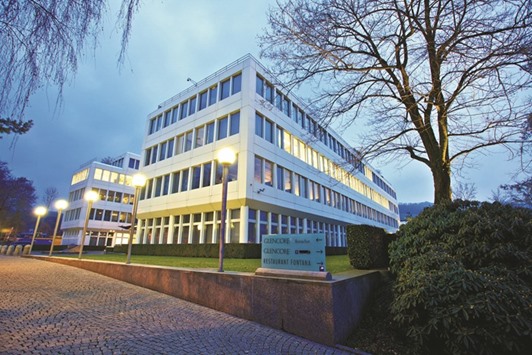Canada’s largest pension fund agreed to pay $2.5bn for a minority stake in Glencore’s agriculture unit as the commodity trader and miner works to reduce its debt burden.
Canada Pension Plan Investment Board will acquire a 40% stake in the division which handles wheat, corn, barley, biofuels, cotton and sugar, according to a statement yesterday. The deal values the entire business at $6.25bn, below a $10.5bn valuation from Citigroup in September last year.
The price “was the low end of our valuation range, but it is not necessarily a disappointment,” said Ben Davis, an analyst at Liberum Capital in London who advises holding the shares. “Cash through the door remains key for Glencore.”
The sale is part of a debt-cutting program Glencore chief executive officer Ivan Glasenberg unveiled last year in a move to mitigate concern about the company’s capacity to pay down $30bn of debt as commodity prices tumbled. Canada Pension fended off other bidders that included Asian and Middle Eastern sovereign wealth funds and the state-owned Saudi Agricultural and Livestock Investment Co.
Glencore shares slipped 1.8% to 139.30 pence by 11:08am in London. The company’s €588mn of notes maturing in April 2021 rose 1.8¢ on the euro to 93¢, the highest since September, according to data compiled by Bloomberg.
The price “is lower than market expectations based on discussions with investors,” Goldman Sachs Group analyst Eugene King, who has a hold rating on the stock, wrote in a note to clients. The cash will help lower debt, but it will have minimal impact on the critical net debt to Ebitda ratio assessed by ratings agencies, he said.
Glencore has an option to sell as much as 20% more in the business. Both Glencore and CPPIB can call for an initial public offering after eight years from the deal closing, expected to be in the second half of this year.
Glencore became a major agriculture player when it agreed to buy Canadian grain handler Viterra for C$6.1bn ($4.6bn) in 2012. With global network of more than 200 storage facilities and 23 ports, the company buys products from farmers, processors and other suppliers and sells to customers including local importers and government agencies.
The unit has gross assets of $10.2bn and generated earnings before interest, taxes, depreciation and amortisation of $734mn last year.
As the commodity collapse intensified in 2015, Glencore fought to reduce its debt burden, which totalled $25.9bn at the end of last year, by scrapping its dividend, closed mines and sold $2.5bn of new shares. Last month, the company pledged to cut net debt to as low as $17bn and raise as much as $5bn from selling assets.
“CPPIB have a proven track record in the sector and share our vision for the future growth of the business through value-creating organic and inorganic growth opportunities,” Glasenberg said in the statement.
The transaction caps three years of intense deal making in the agriculture industry. Last year, Mitsubishi Corp paid just over $1bn for a 20% stake in food trader Olam International Marubeni Corp, one of Japan’s top-five trading houses, bought US grain merchant Gavilon Holdings for $2.7bn plus debt in 2013.
Cofco Corp, China’s largest food company, spent more than $4bn over two years to build a global grain trader. It acquired the grains and oilseeds unit of Noble Group Ltd and a majority stake in Dutch trader Nidera.
Glencore’s agriculture business “is now well-placed to take advantage of the significant opportunities that are expected to emerge across the sector in the coming years,” Mark Jenkins, senior managing director and global head of private investments at CPPIB, said in the statement. Agriculture is an “excellent fit” for a long term investor, he said.
Barclays, Citigroup and Credit Suisse Group were joint financial advisers to Glencore. CPPIB was advised by Deutsche Bank.
Peter Grauer, chairman of Bloomberg, the parent of Bloomberg News, is a senior independent non-executive director at Glencore.

The headquarters of Glencore International in Baar, Switzerland. Canada Pension Plan Investment Board will acquire a 40% stake in Glencore’s division which handles wheat, corn, barley, biofuels, cotton and sugar, according to a statement yesterday.
